Thought I would update everyone on my hair because I know you’ve all been wondering “what’s going on with Josh’s hair lately.” That’s actually not the reason I’m posting this. I’m posting this because I had been looking forward to / dreading this particular piece of our move and I wanted to share my thoughts on the matter.
Whether you give a merde about how your hair looks or not, having a procedure like this done is somewhat personal. It’s also rare enough that the words needed to communicate what you’d like to have done are not part of the day-to-day functionality of any language. These two factors come together to create a stress-inducing scenario where you not only have to find the appropriate place to get this done (appropriate, in this case, meaning not only that they offer a man’s haircut but that you feel OK having it done there) but also describe what, exactly, you’d like to get done. I was nervous.
Thankfully, I had the presence of mind to ask someone (a guy with a good haircut) where I could have this procedure done. As fate would have it, a regular customer at the cafe where I asked happened to be a men-only barber across the street. His name was Sebastien and, in the States, you’d probably think he was gay. In Paris, however, he’s just a very well-dressed and very skilled barber. I told him I wanted to look like a Parisian and he did not disappoint:
Before, an American:
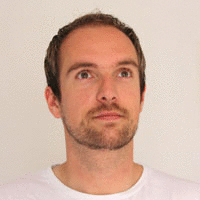
Apres, un Parisian:

Pas mal, oui?
So, with a haircut by a French barber and just enough French to get by, I’m claiming honorary (though temporary) status as a Parisian. As such, I thought it might be a good idea to help my cousin with a little bit of French to get her by during her visit here in a few weeks. The text below is the email I wrote her with a few tips (edited a bit).
First, the easy stuff anyone should know (please forgive the lack of accents… not easy in a web editor).
“Bonjour” (bohn-joor… minimal “n” and “r”, back of the throat, I still can’t get it right) when you first see someone and “bonne journee” (“bun-joor-nay,” all one word) when you’re saying good bye during the day. “Au revoir” (“orv-wah”) works too (goodbye). Do this in stores and restaurants as you come and go.
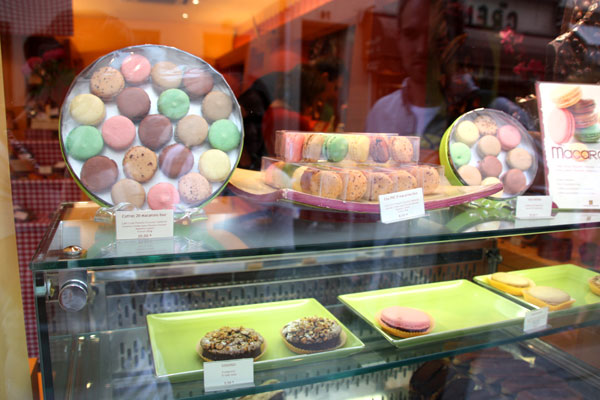
“Ca va?” (“sah-vah?”) is “how’s it going” but that’s a dangerous one for someone that doesn’t know any French because you probably won’t understand the answer. If, however, you hear “ca va” in return, you’ll know they meant “meh, not bad.” You also know if someone asks you “ca va?” you can shrug your shoulders, take a drag off of your cigarette, and say “ca va…” in return. Though this was the cool way to say “how’s it going” when I learned french 15 years ago, I have yet to hear it said now except as a reply to something else. I guess people here aren’t really concerned with how it’s going in your life. That might not be such a bad thing.
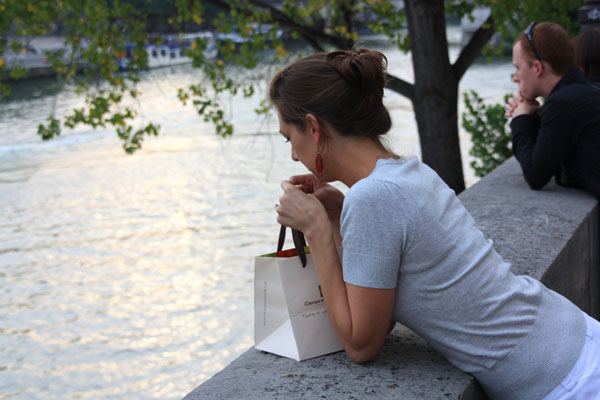
“Bon soir” (“bohn-swah”) is like saying “hello” at night (good evening) and “bonne soiree” (“bun-swah-ray”) is saying good bye at night. You will, of course, screw all of this up and say the wrong things at the wrong time but, despite stories from the States, there is no language police here. More often than not, people will be appreciative that you gave their language a shot even if you’ve failed miserably.
“Merci” (“mehr-see”) for thank you and “s’il vois plait” (“see-voo-play”) for please, tout les temps (all the time). “Excusez-moi” (“ex-coo-say-mwah”) for excuse me (want to get by, step on a toe, fart), “pardon” (“pahr-dohn”) for a simple “excuse me” (bump into someone) or nothing at all… I feel better saying something though. “Desolee” (“day-sole-ay”) for an actual “I’m sorry” (beggars, random questions in French that you don’t understand). I probably say these phrases more than anything in an attempt to be polite. I find myself more comfortable being more polite than the situation might call for… you can’t really go wrong saying please and thank you too much, in my humble opinion.
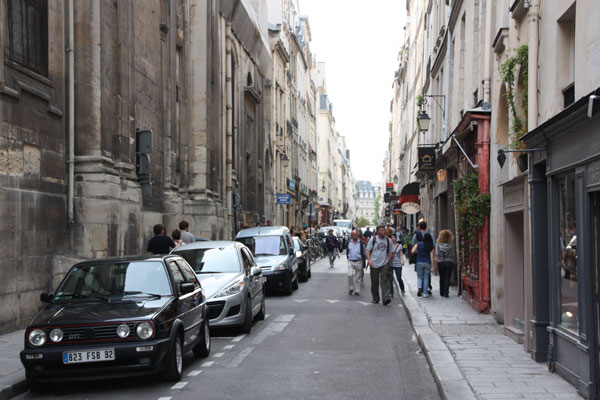
“Vin” (“vahn” .. minimal “n” again, hard to get right) for wine and “biere” (“bee-air” … that throaty “r” that Americans are genetically incapable of doing) for beer (Kronenbourg is the local fav, hard to go wrong here). “Jambon” (“jahm-bohn”) is ham, “poulet” (“poo-lay”) is chicken, “beouf” (“buff”) is beef (sometimes you’ll see “viande” which is technically meat but they use it for beef sometimes), “dinde” (“dand”) is turkey, and “legumes” (“lay-gume”) or “crudite” (“croo-dee-tay”) for vegetables. “Fromage” (“fro-mahj”) is, of course, cheese.
I told Anna the other day that I thought it was so funny thinking back to my years of French instruction and wondering why we learned how to say cheese, ham, and coffee before anything else. It is, of course, because that’s about all anyone eats here, really.
There is no such thing as: drip coffee (that’s a good thing… espresso is never bad here), spicy things (unless you count black pepper), Zinfandel (hahaha), personal space when you leave your house, non-smoking areas, Netflix, or any convenient time to talk to someone on the West Coast.
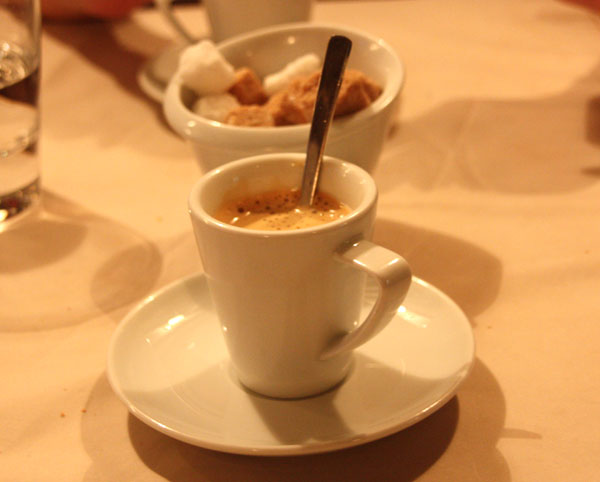
“Sur la place” (“soor-lah-plass”) as “for here” in restaurants, “enporter a emporter” (“ohn-pour-tay ah-ahm-pour-tay”) to go. In markets, tell people what you want, don’t grab it. Just point and say the amount (1, 2, 3, 4, 5 = “uhn, duh, twah, cat, sank”), they’ll pick it out (and typically pick the best ones for you).
“Parlez vous Anglais?” (“pahr-lay-vooz-ohn-glay”) is “do you speak English” and “je ne comprende pas” (“juh-nuh-coom-prehn-pah”) is “I don’t understand.”
Eat with utensils, even if it’s french fries or pizza or a burger (just do it), smoke a lot, look at people like they’re idiots for the most part (people don’t smile a lot on the street but it’s ok to mumble a “bon soiree” now and then), break off bread into bite-sized pieces before eating, keep to the right on escalators, and look busy and slightly distracted but not totally detached. Bring extra money… especially in Paris.
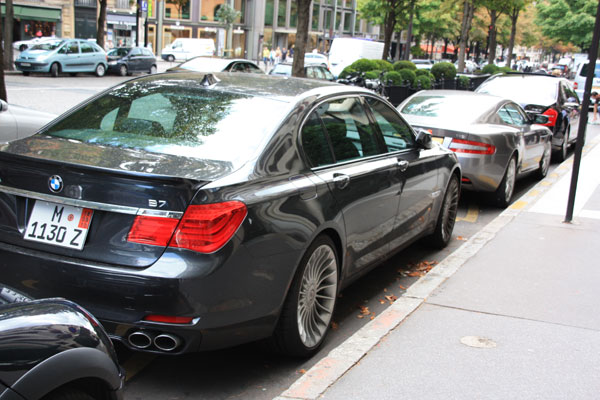
If you need anything in a restaurant or, really, anywhere, you have to ask for it because they’ll assume you’re fine and just taking your time. The idea of “service” here is very different. Some think it’s rude to have to ask for what you want. Here, they think it’s rude to assume that they know. The transition is strange but, after a few times, it feels right.
Dress nice, be polite, enjoy the food, and take you time and you’ll fit right in.
Or not…

< Take Action >
Comment via:
Subscribe via:
< Read More >
Tags
Newer

Sep 17, 2010
Miles to go before we sleep
Paris is a walking city. Someone told me that before I left San Diego and they were completely correct. If you can’t get there by foot, you walk to the Metro and take the train.
Older
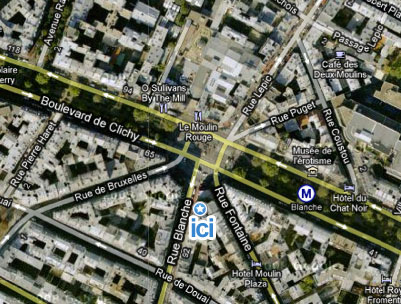
Aug 25, 2010
The unfamiliar and wonderful life we now lead
Let me tell you a little bit about this strange, wonderful, and very Parisian life we’ve made for ourselves here. We live in the 9th arrondissement in an area known as Montmartre (or, as we learned from the owner’s son, “the Nine”).